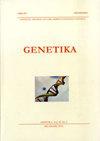C9orf72 genetic screening in amyotrophic lateral sclerosis patients from Serbia
4区 农林科学
Q3 Agricultural and Biological Sciences
引用次数: 0
Abstract
Hexanucleotide repeats expansion in the C9orf72 gene is the most common cause of familial and sporadic amyotrophic lateral sclerosis (ALS) cases in Europe. In this study we aimed to determine the size and distribution of C9orf72 alleles, and investigate the possible association of the repeat size with several clinical parameters in ALS patients from Serbia. Patients were recruited from 2011-2021 and analysed using fragment length analysis and Southern blot. Out of 383 ALS patients, we have detected 31 (8.09%) patients with repeat expansion. In the total ALS cohort, clinical overlap with frontotemporal dementia (FTD) was registered in 17 (4.44%) patients, and among them, 5 (29.41%) were expansion carriers. There was no difference in the age of onset, age at the examination or disease duration, gender, and the frequency of spinal and bulbar onset between patients with and without C9orf72 expansion. The presence of positive family history (34.48% vs. 15.65%) and FTD (16.13% vs. 3.41%) was more frequent in expansion-positive vs. expansion-negative patients. In expansion-positive patients, significantly higher values of the largest detected repeat were found in patients with ALS in the family, and in expansion-negative, a higher median value of the smaller allele was noted in patients with a positive family history of ALS, dementia, and both in comparison to the rest of the group. A correlation of the repeat size was not found with the age of onset in both patients with and without the expansion. This is the first detailed study of C9orf72 sizing in ALS patients from Serbia. Our results emphasize the need for C9orf72 genetic screening in ALS patients with/without FTD.塞尔维亚肌萎缩侧索硬化症患者C9orf72基因筛查
在欧洲,C9orf72基因的六核苷酸重复扩增是家族性和散发性肌萎缩性侧索硬化症(ALS)病例的最常见原因。在这项研究中,我们旨在确定C9orf72等位基因的大小和分布,并探讨塞尔维亚ALS患者重复序列大小与几个临床参数的可能关联。从2011-2021年招募患者,并使用片段长度分析和Southern blot进行分析。在383例ALS患者中,我们发现31例(8.09%)患者重复扩张。在ALS总队列中,17例(4.44%)患者与额颞叶痴呆(FTD)有临床重叠,其中扩展携带者5例(29.41%)。C9orf72扩张患者与非C9orf72扩张患者在发病年龄、检查年龄或病程、性别、脊柱和球部发病频率方面无差异。阳性家族史(34.48%对15.65%)和FTD(16.13%对3.41%)在扩张阳性和扩张阴性患者中更为常见。在扩增阳性患者中,家族中ALS患者的最大重复基因检测值显著较高,而在扩增阴性患者中,与其他患者相比,具有ALS、痴呆等阳性家族史的较小等位基因的中位数较高。在有和没有扩张的患者中,重复大小与发病年龄没有相关性。这是对塞尔维亚ALS患者C9orf72大小的首次详细研究。我们的研究结果强调了在伴有/不伴有FTD的ALS患者中进行C9orf72基因筛查的必要性。
本文章由计算机程序翻译,如有差异,请以英文原文为准。
求助全文
约1分钟内获得全文
求助全文
来源期刊

Genetika-Belgrade
AGRONOMY-GENETICS & HEREDITY
CiteScore
1.80
自引率
0.00%
发文量
1
审稿时长
6-12 weeks
期刊介绍:
The GENETIKA is dedicated to genetic studies of all organisms including genetics of microorganisms, plant genetics, animal genetics, human genetics, molecular genetics, genomics, functional genomics, plant and animal breeding, population and evolutionary genetics, mutagenesis and genotoxicology and biotechnology.
 求助内容:
求助内容: 应助结果提醒方式:
应助结果提醒方式:


